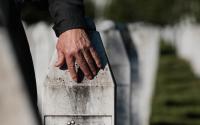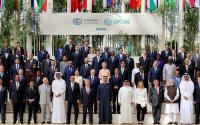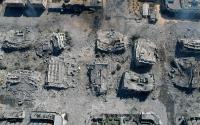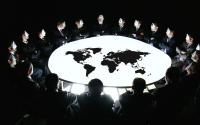Fernand Braudel Center, Binghamton University List of previous commentaries in English and translations in other languagesCommentary No.161, May 15, 2005
Was it really George W. Bush who was the guest of honor at the celebration of the sixtieth anniversary of V-E Day in Moscow on May 8, 2005? Did he really stand on Red Square next to Putin to review goose-stepping Russian troops carrying hammer-and-sickle banners with the image of Lenin while Russian jets roared overhead? I think the world press has underplayed the monumental character of this event. How is it that the major event of this sixtieth anniversary was celebrated in Moscow, and not in Washington, London, Paris, or anywhere else? How come everyone came? By everyone, I mean the presidents of France, China, Israel, the prime ministers of Germany, Italy, Japan, India, South Korea, the Secretary-General of the United Nations, and assorted other representatives of some fifty countries. The only major world figure not to come in person was the Prime Minister of Great Britain (too busy perhaps with salving his wounds after a narrow electoral victory that was less than glorious). Also missing were top echelon figures from North Korea (perhaps anxious not to be forced into a meeting on the side of the six-nation group discussing nuclear armaments).
Furthermore, Putin rubbed salt into the wounds of the United States. He took the opportunity to give an interview to the U.S. press criticizing U.S. world policy, and more important to have a summit with leaders of the European Union in order to sign four "road map" accords on the economy; freedom, security, and justice; external security; and research, education, and culture. This follows the April 11 accord with Germany on economic cooperation in eight major areas including nano- and bio-technologies and oil and gas transportation. And since Jacques Chirac also came and stood at Putin's right (while Bush was at his left), Putin accompanied Chirac to inaugurate the monument to Charles De Gaulle.
The U.S. press made much of the fact that three countries refused to come to the celebrations (Estonia, Lithuania, and Georgia), and that President Bush sandwiched his trip to Moscow with a visit before to Riga (where he met the presidents of the three Baltic states) and one after to Georgia, where he gave fire-eating speeches about democracy and received the crowd's cheers for being critical of Putin and Russia about both the present and the past. Why then did Bush go to Moscow at all? In November 2001, Putin visited Bush in Crawford, Texas, and Bush famously talked of trusting Putin, because he "looked him in the eyes." In May 2005, Bush got into Putin's somewhat ancient private automobile and drove Putin around, both of them with broad smiles on their faces, so that every photographer could see how close they were. What's the point of all of this?
This is old Cold War technique on both sides. The U.S. was using lots of rhetoric about freedom, but the bottom line is to do nothing, just as the U.S. used rhetoric to denounce the Soviet repression in Hungary in 1956 and in Czechoslovakia in 1968 but essentially did nothing. The U.S. did nothing then because they needed the Soviet Union to keep the lid on nuclear conflict. And today, despite Bush denouncing the Yalta accords, the U.S. still needs Russia. But there is one difference. In the Cold War days, the Soviet Union also needed the United States. So they too used a lot of rhetoric but essentially did nothing. Today, however, the U.S. needs Russia more than Russia needs the United States. It's no longer such a balanced equation.
That the U.S. needs Russia today will be a surprise to most Americans but not to analysts elsewhere in the world. The U.S. needs Russia for a lot of things. It needs Russia so that it not be as isolated in the world diplomatically as it currently is. It needs Russia not to move too close to France and Germany. It needs Russia not to give so much support to Iran. It needs Russia to cooperate on various intelligence matters. One has to say that it is not getting very much along any of these lines from Russia. What does Russia need from the United States? Well, the one thing it doesn't really want is to start up an expensive arms competition, once again. The U.S. keeps threatening this. The question is does it have the money to do it, really?
Well, one can say the U.S. also wants to gain diplomatic and political support among the countries of the former Soviet Union. That's true. And these countries are often ready to play the game. But they want more than words. And the question is, how far is the U.S. ready to go in Georgia to get Russia to withdraw its troops. In the end Saakashvili needs to come to terms with Putin, not with George W. Bush. And Bush will continue to put Putin ahead of Saakashvili. It's a question of priorities.
Of course, both Bush and Putin have to worry about their home audiences. Hence the rhetoric, especially on the side of Bush. But those who really want some anti-Russian action in the United States are already getting wary of Bush - all talk and not much action. And money, money, money!
On May 10, the Ottawa Citizen in Canada had a political cartoon which sums up the situation: It shows a diminutive Bush walking beside an extremely tall Putin. Bush's head only reaches the top of Putin's legs. And he is saying: "Wow...I can still see into your soul from here, Vladimir!" Putin, who no doubt is having some trouble at home these days, is compensating by doing quite well in the geopolitical arena. As an old KGB officer, he must be smiling a sweet smile.






